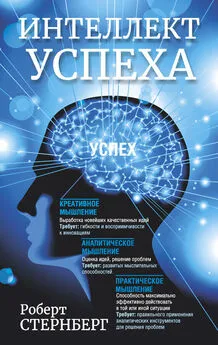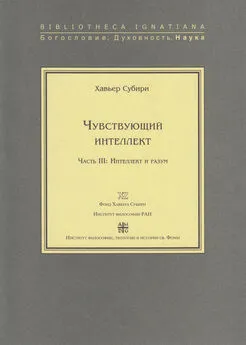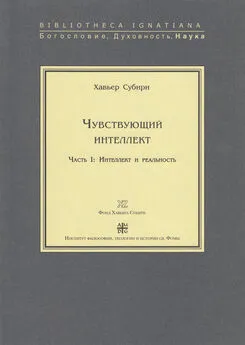Роберт Стернберг - Интеллект успеха
- Название:Интеллект успеха
- Автор:
- Жанр:
- Издательство:Литагент «Попурри»5bad7fc6-141f-11e5-92fc-0025905a069a
- Год:2015
- Город:Минск
- ISBN:978-985-15-2561-0
- Рейтинг:
- Избранное:Добавить в избранное
-
Отзывы:
-
Ваша оценка:
Роберт Стернберг - Интеллект успеха краткое содержание
Знаменитый американский психолог написал книгу, которой суждено оказать сильнейшее воздействие на наши представления о мыслительных способностях. По мнению Роберта Стернберга, отличительной особенностью так называемого интеллекта успеха является оптимальное сочетание трех видов мышления креативного, практического и аналитического. Обладатели интеллекта успеха знают, как извлечь максимум из своих достоинств, и умеют грамотно действовать в любой ситуации. Будучи настойчивыми и целеустремленными, имея сильнейшую мотивацию, успешные люди понимают, как идти вперед, преодолевая все преграды. Эта книга содержит все необходимые инструменты для того, чтобы каждый читатель мог развить в себе мыслительные навыки, которые приведут вас к величайшему успеху.
Интеллект успеха - читать онлайн бесплатно ознакомительный отрывок
Интервал:
Закладка:
Примечания
1
R. Herrnstein, and C. Murray. The Bell Curve (New York: Free Press, 1994).
2
S. Morison. The Oxford History of the American People, vol. 2 (New York: Penguin Books, 1972).
3
S. Ceci. On Intelligence. More or Less: A Bio-ecological Treatise on Intellectual Development (Englewood Cliffs, N. J.: Prentice-Hall, 1990).
4
S. Morison. The Oxford History of the American People.
5
S. Morison. The Oxford History of the American People.
6
F. Galton. Inquiry into Human Faculty and Its Development (London: Macmillan, 1883).
7
A. Binet, and T. Simon. The Development of Intelligence in Children (1905; Baltimore: Williams & Wilkins, 1916).
8
Binet, and T. Simon. The Development of Intelligence in Children (1905; Baltimore: Williams & Wilkins, 1916).
9
R. Thorndike, E. Hagen, and J. Sattler. Technical Manual for the Stanford-Binet Intelligence Scale (Chicago: Riverside, 1986).
10
J. Herrnstein, and C. Murray. The Bell Curve.
11
J. Flynn. «Massive IQ Gains in 14 Nations: What IQ Tests Really Measure». Psychological Bulletin 101 (1987), pp. 171–191.
12
D. Detterman, and R. Sternberg. How and How Much Can Intelligence Be Increased? (Norwood, N. J.: Ablex, 1982).
13
I. Lazar, and R. Darlington. «Lasting Effects of Early Education: A Report from the Consortium for Longitudinal Studies». Monographs of the Society for Research in Child Development 47 , nos. 2–3 (1982), Serial № 195. E. Zigler, and W. Berman. «Discerning the Future of Early Childhood Intervention». American Psychologist 38 (1983), pp. 894–906.
14
M. Adams. Odyssey: A Curriculum for Thinking (Water-town, Mass.: Mastery Education Corporation, 1986).
15
S. Messick. The Effectiveness of Coaching for the SAT: Review and Reanalysis of Research from the Fifties to the FTC (Princeton: Educational Testing Service, 1980).
16
R. Sternberg. «Most Vocabulary Is Learned from Context». В книге: M. McKeown, and M. Curtis. The Nature of Vocabulary Acquisition (Hillsdale, N. J.: Lawrence Erlbaum, 1987), pp. 89—105.
17
J. Baron, and R. Sternberg. Teaching Thinking Skills: Theory and Practice (New York: Freeman, 1987).
18
C. Dweck. «Self Theories and Goals: Their Role in Motivation, Personality, and Development». В книге: R. Dienstbier. Nebraska Symposium on Motivation, 1990: Perspectives on Motivation (Lincoln: University of Nebraska Press, 1991), pp. 199–235.
19
R. Sternberg, and D. Detterman. What Is Intelligence? Contemporary Viewpoints on Its Nature, and Definition (Norwood, N.J.: Ablex, 1986).
20
C. Spearman. «‘General Intelligence’ Objectively Determined and Measured». American Journal of Psychology 15 (1904), pp. 201–293. C. Spearman. The Abilities of Man (London: Macmillan, 1927).
21
P. Wason. «On the Failure to Eliminate Hypotheses in a Conceptual Task». Quarterly Journal of Experimental Psychology 12 (1960), pp. 129–140.
22
B. Skyrms. Choice and Chance. An Introduction to Inductive Logic (Encino, Calif.: Dickerson, 1975).
23
J. Guilford. «Cognitive Psychology’s Ambiguities: Some Suggested Remedies». Psychological Review 89 (1982), pp. 48–59.
24
R. Cattell. Abilities: Their Structure, Growth, and Action (Boston: Houghton Mifflin, 1971).
25
A. Willner. «An Experimental Analysis of Analogical Reasoning». Psychological Reports 15 (1964), pp. 479–494.
26
A. Jensen. «Psychometric g as a Focus of Concerted Research Effort». Intelligence 11 (1987), pp. 193–198.
27
A. Jensen. «Psychometric g as a Focus of Concerted Research Effort». Intelligence 11 (1987), pp. 193–198.
28
W. Mischel. Personality and Assessment (New York: Wiley, 1968).
29
E. Hunt. «Mechanics of Verbal Ability». Psychological Review 85 (1978), pp. 109–130.
30
K. Stanovich. «Reconceptualizing Intelligence: Dysrationalia as an Intuition Pump» . Educational Researcher 23, № 4 (1994), pp. 11–22.
31
P. Barrett, and H. Eysenck. «Brain Evoked Potentials and Intelligence: The Hendrickson Paradigm». Intelligence 16 (1992), pp. 361–381.
32
P. McGarry, R. Stelmack, and K. Campbell. «Intelligence, Reaction Time, and Event-Related Potentials». Intelligence 16 (1992), pp. 289–313. T. Reed, and A. Jensen. «Conduction Velocity in a Brain Nerve Pathway of Normal Adults Correlates with Intelligence Level» . Intelligence 16 (1992), pp. 259–272. P. Vernon, and M. Mori. «Intelligence, Reaction Times, and Peripheral Nerve Conduction Velocity». Intelligence 8 (1992), pp. 273–288.
33
R. Haier, B. Siegel, C. Tang, L. Abel, and M. Buchsbaum. «Intelligence and Changes in Regional Cerebral Glucose Metabolic Rate Following Learning». Intelligence 16 (1992), pp. 415–426.
34
J. Wickett, and P. Vernon. «Peripheral Nerve Conduction Velocity, Reaction Time, and Intelligence: An At-tempt to Replicate Vernon and Mori». Intelligence 18 (1994), pp. 127–132.
35
A. Hendrickson, and D. Hendrickson. «The Biological Basis for Individual Differences in Intelligence». Personality @ Individual Differences 1 (1980), pp. 3—33.
36
M. Mishkin, and H. Petri. «Memories and Habits Some Implications for the Analysis of Learning, and Retention». в книге: L. Squire, and N. Butters. Neurophysiology of Memory (New York: Guilford, 1984), pp. 287–296.
37
R. Serpell. «The Cultural Construction of Intelligence». в книге: W. Lonner, and R. Malpass. Psychology and Culture (Boston: Allyn & Bacon, 1994).
38
R. Serpell. The Significance of Schooling Life Journeys in an African Society (Cambridge, Eng.: University of Cambridge Press, 1993).
39
S. Sarason, and J. Doris. Educational Handicap, Public Policy, and Social History (New York: Free Press, 1979).
40
H. Eysenck, and L. Kamin. The Intelligence Controversy: H. Eysenck versus Leon Kamin (New York: Wiley, 1981).
41
S. Ceci. «How Much Does Schooling Influence General Intelligence and Its Cognitive Components? A Reas-sessment of thee Evidence». Developmental Psychology 27, № 5 (1991), pp. 703–722.
42
R. Cattell, and A. Cattell. Test of g: Culture Fair, Scale 3 (Champaign, Ill.: Institute for Personality and Ability Testing, 1963).
43
A. Jensen. Bias in Mental Testing (New York: Free Press, 1980).
44
L. Thurstone. The Nature of Intelligence (New York: Harcourt Brace, 1924).
45
J. Berry. «Radical Cultural Relativism and the Concept of Intelligence». в книге: J. Berry, and P. Dasen. Culture and Cognition: Readings in Cross-Cultural Psychology (London: Methuen, 1974), pp. 225–229.
46
P. Greenfield. «Testing in Collectivistic Cultures». American Psychologist (в печати).
47
K. Sternberg, and B. Rifkin. «The Development of Analogical Reasoning Processes». Journal of Experimental Child Psychology 27 (1979), pp.195–232.
48
S. Ceci. «How Much Does Schooling Influence General Intelligence».
49
D. Wagner. «Memories of Morocco: The Influence of Age, Schooling and Environment on Memory». Cognitive Psychology 10 (1978), pp. 1—28.
50
S. Ceci, and A. Roazzi. «The Effects of Context on Cognition: Postcards from Brazil». в сборнике: R. Sternberg, and R. Wagner. Mind in Context: Interactionist Perspectives on Human Intelligence (New York: Cambridge University Press, 1994), pp. 74—101.
51
S. Ceci, and U. Bronfenbrenner. «Don’t Forget to Take the Cupcakes Out of the Oven: Strategic Time-Monitoring, Prospective Memory, and Context». Child Development 56 (1985), pp. 175–190.
52
A. Schliemann, and V. Magalhues. Proportional Reasoning From Shops, to Kitchens, Laboratories, and Hopefully Schools (Proceedings of the Fourteenth International Conference for the Psychology of Mathematical Education, Oaxtepec, Mexico, 1990).
53
H. Gardner. «Multiple Intelligences». The Theory in Practice (New York: Basic Books, 1993).
54
D. Lubinsky, and C. Benbow. «An Opportunity for ‘Accuracy’». Contemporary Psychology 40 , № 10 (1995), pp. 939–940. R. Sternberg. «A Triarchic Model for Teaching and Assessing Students in General Psychology». General Psychologist 30 , № 2 (1994), pp. 42–48.
55
R. Sternberg. «Implicit Theories of Intelligence, Creativity, and Wisdom». Journal of Personality and Social Psychology 49 (1985), pp. 607–627.
56
R. Sternberg, R. Wagner, and L. Okagaki. «Practical Intelligence: The Nature and Role of Tacit Knowledge in Work and at School». в книге: H. Reese, and J. Puckett. Advances in Lifespan Development (Hillsdale, N. J.: Erlbaum, 1993), pp. 205–227. R. Wagner, and R. Sternberg. «Practical Intelligence in Real-World Pursuits: The Role of Tacit Knowledge». Journal of Personality, and Social Psychology 49 (1985), pp. 436–458.
57
R. Sternberg. In Search of the Human Mind (Orlando, Fla.: Harcourt Brace College Publishers, 1995).
58
R. Sternberg. Beyond IQ: A Triarchic Theory of Human Intelligence (New York: Cambridge University Press, 1985).
59
M. Cole, J. Gay, J. Glick., and D. Sharp. The Cultural Context of Learning, and Thinking (New York: Basic Books, 1971).
60
L. Spear-Swerling. Частное сообщение.
61
R. Edgerton. The Cloak of Competence (Berkeley: University of California Press, 1967).
62
L. Okagaki, and R. Sternberg. «Parental Beliefs and Children’s School Performance». Child Development 64 , № 1 (1993), pp. 36–56.
Читать дальшеИнтервал:
Закладка:








